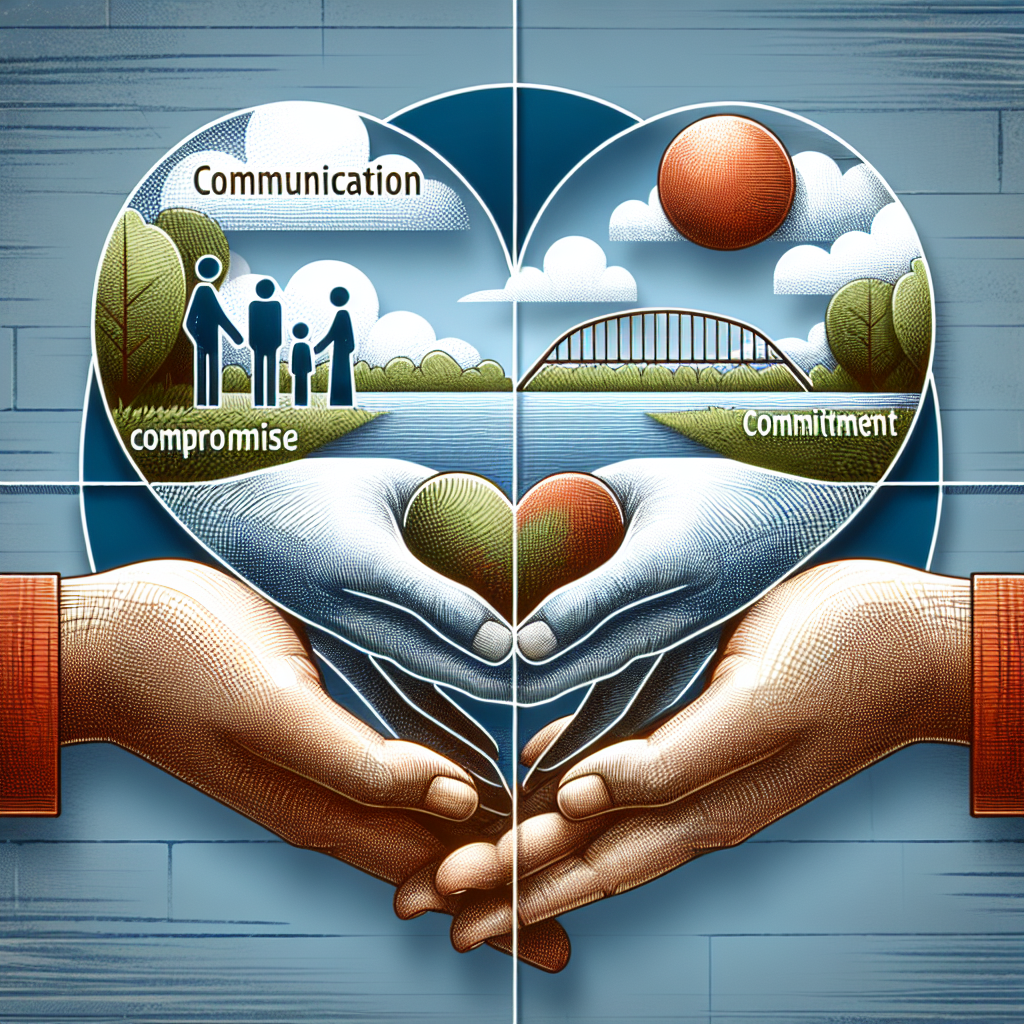In this article, you will discover the three fundamental pillars that form the foundation of successful relationships. Whether you’re in a romantic partnership, a friendship, or even a professional rapport, understanding these three C’s will empower you to nurture and strengthen your connections with others. So, let’s explore these key elements that are essential for building and maintaining fulfilling relationships. The 3 big C’s of relationships refer to communication, commitment, and compatibility. These elements are essential for building and maintaining strong and healthy relationships. Each of these C’s plays a crucial role in fostering love, trust, and understanding between partners. In this article, we will explore these 3 big C’s in detail and understand how they contribute to a successful and fulfilling relationship.

Communication
Importance of effective communication
Effective communication is the cornerstone of any successful relationship. It encompasses both verbal and non-verbal forms of interaction. By expressing your thoughts, feelings, and needs clearly, you can avoid misunderstandings and foster mutual understanding. Open and honest communication helps build trust and strengthens the emotional connection between partners.
Listening skills
Listening is an equally important aspect of communication. It involves actively paying attention to your partner’s words, thoughts, and emotions. By being a good listener, you demonstrate empathy and validate your partner’s feelings. This creates a safe space for open communication and encourages your partner to share their concerns and joys with you.
Verbal and non-verbal communication
In relationships, it is essential to effectively communicate both verbally and non-verbally. Verbal communication includes the use of words, tone, and choice of language. Non-verbal communication, on the other hand, encompasses body language, facial expressions, and gestures. Both forms of communication work together to convey messages and emotions accurately.
Expressing emotions
A healthy relationship encourages the open expression of emotions. It is important to articulate your feelings honestly and respectfully. By sharing your emotions, you create an environment where your partner feels safe to do the same. It fosters emotional intimacy and strengthens the bond between partners.
Resolving conflicts through communication
Conflict is inevitable in any relationship, but how you handle it determines the health of your relationship. Effective communication plays a key role in resolving conflicts. By actively listening, expressing your needs and concerns, and seeking compromise, you can find solutions that work for both partners. Communication helps navigate challenging situations and strengthens the relationship in the process.
Commitment
Definition and significance of commitment
Commitment is the dedicated and unwavering devotion to a relationship. It involves a sense of responsibility and loyalty to your partner. Commitment is a vital ingredient in building a strong foundation for a lasting relationship. It signifies your willingness to invest time, effort, and energy into making the relationship thrive.
Building trust and loyalty
Trust and loyalty are fundamental aspects of commitment. They go hand in hand, forming the bedrock of a strong relationship. By being reliable, honest, and consistent, you establish trust with your partner. Loyalty involves standing by your partner’s side, especially during difficult times, and being faithful and supportive.
Investing time and effort
Commitment requires investing time and effort into the relationship. It means making your partner a priority and dedicating quality time to nurture the bond you share. By actively participating in activities together and creating shared experiences, you strengthen your connection and demonstrate your commitment.
Staying dedicated during challenging times
Commitment is tested during challenging times. It is during these moments that your dedication to the relationship truly shines. By sticking together, supporting each other, and weathering the storm as a team, you reinforce your commitment and build resilience within the relationship.
Being supportive and understanding
Being supportive and understanding is an essential aspect of commitment. It involves being there for your partner, offering a listening ear, and providing emotional support when needed. Understanding your partner’s needs, dreams, and aspirations and actively supporting them contributes to a fulfilling and committed relationship.
Compatibility
Understanding compatibility in relationships
Compatibility refers to the degree of harmony and agreement between partners. It involves shared values, goals, and interests that align with each other. Compatibility forms a strong foundation for a thriving relationship, providing a solid base for growth and connection.
Shared values and goals
Shared values and goals are essential components of compatibility. They provide a common ground for partners to connect and make decisions together. When partners share similar values and aspirations, they are more likely to find agreement and support each other in achieving their goals.
Respecting individual differences
In relationships, it is important to respect and embrace individual differences. Each person is unique, with their own perspectives, preferences, and quirks. By valuing and accepting these differences, you create a space for both partners to be their authentic selves, fostering a stronger and more harmonious relationship.
Balancing personal and shared interests
Balancing personal and shared interests is crucial for a healthy relationship. While it is important to maintain individual identities and pursue personal passions, finding common interests and engaging in activities together strengthens the bond between partners. It creates opportunities for growth, exploration, and lasting memories.
Promoting growth and development
Compatibility allows for personal growth and development within the relationship. Partners who support and encourage each other’s personal growth create an environment where both individuals can thrive. By fostering an atmosphere of growth, you cultivate a relationship that is both fulfilling and empowering.
Love and Affection
Importance of love and affection in relationships
Love and affection are vital components of a healthy and fulfilling relationship. They provide emotional nourishment and create a deep sense of connection between partners. Love and affection lay the foundation for intimacy, trust, and overall relationship satisfaction.
Expressing love and affection
Expressing love and affection is crucial in a relationship. It involves verbalizing your feelings and demonstrating physical affection. Simple gestures such as saying “I love you,” giving hugs, holding hands, and engaging in acts of kindness reinforce the love and affection you feel for your partner.
Emotional intimacy
Emotional intimacy involves sharing and connecting on an emotional level. It requires vulnerability and being open about your thoughts, fears, and dreams with your partner. When emotional intimacy is nurtured, it deepens the bond between partners and creates a strong emotional connection.
Physical intimacy
Physical intimacy encompasses more than just sexual intimacy. It involves physical closeness, touching, cuddling, and expressing desire for one another. Physical intimacy fosters a sense of security and strengthens the emotional and physical connection between partners.
Nurturing the relationship
Nurturing the relationship is crucial to sustain love and affection. It involves regularly expressing love and appreciation, fostering a positive and loving atmosphere, and continuously investing time and effort into the relationship. Nurturing the relationship helps the love and affection between partners grow and flourish.

Trust
Building trust in relationships
Trust forms the foundation of any successful and lasting relationship. Without trust, a relationship cannot thrive. Building trust requires consistent and honest actions that demonstrate reliability and faithfulness.
Open and honest communication
Open and honest communication is a key factor in building trust. By sharing your thoughts, feelings, and experiences honestly, you create an environment of transparency and authenticity. Being open and honest reduces doubt and suspicion, fostering trust between partners.
Consistency and reliability
Consistency and reliability are essential in building trust. It involves following through on commitments, being dependable, and keeping promises. When partners can rely on each other consistently, trust is strengthened, and the relationship becomes more secure.
Forgiveness and second chances
Trust can be damaged in a relationship, and forgiveness is crucial to rebuilding it. When mistakes are made, forgiveness allows for growth and healing. Offering second chances and being willing to work through difficulties supports the process of restoring trust.
Maintaining confidentiality
The ability to maintain confidentiality is an important aspect of trust. Keeping private matters and intimate details within the relationship strengthens the bond between partners. Respecting each other’s privacy and confidences is key to creating a sense of trust and security.
Respect
Mutual respect in relationships
Mutual respect is essential for a healthy and thriving relationship. It involves honoring each other’s thoughts, opinions, and boundaries. When partners respect each other, they create an atmosphere of trust, safety, and equality.
Acceptance and appreciation
Accepting and appreciating your partner for who they are is a significant aspect of mutual respect. By valuing their uniqueness and differences, you cultivate an environment that allows both partners to feel respected and cherished.
Boundaries and personal space
Respecting boundaries and personal space is crucial in any relationship. Each partner has their own comfort zone and need for personal space. Respecting these boundaries demonstrates consideration and fosters a sense of respect within the relationship.
Empathy and understanding
Empathy and understanding are key ingredients in respectful relationships. By putting yourself in your partner’s shoes and seeking to understand their perspective, you show empathy and create a supportive and respectful environment. Understanding each other’s feelings and experiences strengthens the connection between partners.
Treating each other with dignity
Treating each other with dignity means treating your partner with kindness, courtesy, and respect. It involves thoughtful and considerate actions and words that demonstrate your admiration and high regard for your loved one. Treating each other with dignity nurtures a relationship built on mutual respect and appreciation.

Friendship
Foundation of a strong relationship
Friendship forms the foundation of a strong and fulfilling relationship. It involves enjoying each other’s company, having fun, and sharing common interests and values. A solid friendship contributes to a deep emotional connection and sets the stage for a lasting partnership.
Having fun and enjoying each other’s company
Having fun and enjoying each other’s company is a crucial element of friendship. Engaging in shared activities, hobbies, and experiences creates a sense of joy and fulfillment within the relationship. Laughing together and creating happy memories strengthens the bond between partners.
Trust and loyalty
Trust and loyalty are essential components of a strong friendship. Like in any other relationship, trust forms the basis for a solid friendship. By being loyal and reliable, you demonstrate your commitment to the friendship and create a safe space for vulnerability and support.
Shared interests and hobbies
Shared interests and hobbies act as a glue that brings friends closer. Engaging in activities that both partners enjoy fosters a sense of connection and camaraderie. Finding common interests and exploring new ones together strengthens the bond of friendship.
Supporting each other’s dreams and aspirations
True friends support and encourage each other’s dreams and aspirations. By cheering each other on and offering support, you create an environment that nurtures personal growth and achievement. Supporting each other’s dreams creates a deep bond of trust and loyalty within the friendship.
Intimacy
Emotional and physical intimacy
Intimacy encompasses both emotional and physical aspects of a relationship. Emotional intimacy involves deep emotional connection, trust, and vulnerability. Physical intimacy, on the other hand, involves closeness and affectionate touch. Both forms of intimacy contribute to overall relationship satisfaction.
Building closeness and connection
Building closeness and connection is central to creating intimacy within a relationship. By sharing thoughts, feelings, and experiences openly, you create a sense of closeness and deepen the emotional bond between partners. Spending quality time together fosters a strong sense of connection.
Sharing vulnerabilities and fears
Sharing vulnerabilities and fears is a significant aspect of intimacy. It involves being open and honest about your insecurities and allowing your partner to do the same. By supporting and comforting each other during times of vulnerability, you build trust and nurture emotional intimacy.
Maintaining a healthy sex life
Physical intimacy is an integral part of many romantic relationships. Maintaining a healthy and satisfying sex life contributes to overall relationship happiness. Open communication, mutual consent, and understanding each other’s needs and desires are essential for a fulfilling physical connection.
Creating a safe and intimate environment
Creating a safe and intimate environment is crucial for fostering intimacy. It involves establishing trust, being supportive, and respecting each other’s boundaries. By cultivating an atmosphere of love and acceptance, you create a space where intimacy can thrive.

Independence
Maintaining individual identities
Maintaining individual identities is vital in any relationship. It involves nurturing your own interests, goals, and personal growth separate from your partner. By having a strong sense of self, you contribute to a healthy and balanced relationship.
Respecting personal space and freedom
Respecting personal space and freedom is crucial for independence. Allowing each other time and space to pursue individual hobbies, spend time with friends, or engage in self-reflection strengthens the independence within the relationship. Respecting personal boundaries creates an atmosphere of trust and autonomy.
Encouraging personal growth
Encouraging personal growth is an important aspect of a healthy relationship. Supporting each other’s personal goals and aspirations demonstrates a deep respect for individuality. Encouragement and motivation contribute to personal development and contribute to a strong and independent partnership.
Balancing togetherness and independence
Balancing togetherness and independence is key to a thriving relationship. It involves finding a healthy middle ground where both partners can enjoy spending time together while also maintaining their individuality. Striking this balance nurtures independence and strengthens the relationship as a whole.
Avoiding co-dependency
Avoiding co-dependency is crucial for individual and relationship well-being. Co-dependency occurs when one partner becomes excessively reliant on the other for emotional needs and validation. By maintaining independence and cultivating a sense of self, you create a relationship based on mutual support rather than co-dependency.
Support
Being there for each other
Support is a crucial aspect of any relationship. Being there for each other, both during challenging times and moments of triumph, strengthens the bond between partners. Offering a listening ear, providing comfort, and being present demonstrates your commitment to supporting your partner.
Offering emotional support
Emotional support is vital in a relationship. It involves actively listening to your partner’s concerns, validating their emotions, and offering comfort. By providing a safe space for your partner to express their feelings, you create an environment of trust and understanding.
Providing encouragement and motivation
Providing encouragement and motivation is an essential part of support. By believing in your partner’s capabilities and offering words of encouragement, you empower them to overcome challenges and achieve their goals. Motivation plays a critical role in personal growth and strengthens the relationship.
Helping each other during tough times
Tough times are inevitable in any relationship. Being a source of support during these challenging periods is crucial. By offering practical assistance, lending a listening ear, and standing by your partner’s side, you show your commitment to weathering difficult times together.
Celebrating successes together
Celebrating successes together is an essential element of support. Sharing joy and happiness during moments of achievement reinforces the bond between partners. By celebrating each other’s successes, big or small, you strengthen the foundation of your relationship.
In conclusion, the 3 big C’s of relationships – communication, commitment, and compatibility – play a crucial role in building and nurturing strong and healthy relationships. Effective communication fosters understanding, trust, and emotional intimacy. Commitment involves dedication, trust, and loyalty to the relationship. Compatibility allows for shared values, individual differences, and personal growth. These elements, combined with love, affection, trust, respect, friendship, intimacy, independence, and support, contribute to a fulfilling and lasting partnership. By embracing and cultivating these aspects, you can create a relationship that thrives and brings joy and happiness to both you and your partner.


